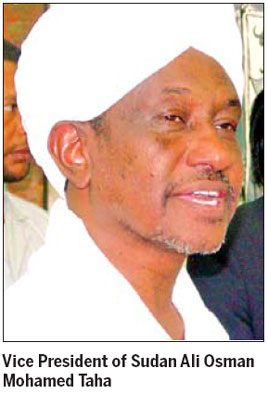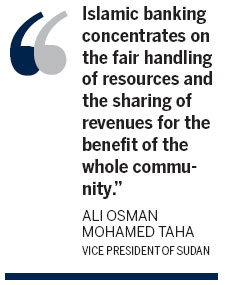News
Stable banking sector offers golden rewards
(China Daily)
Updated: 2010-10-28 08:07
 |
Large Medium Small |
Financial services industry is underpinning growth in Sudan
Modern, efficient and stable, the Republic of the Sudan's banking and financial services sector is well regulated and continues to attract international interest and investment, particularly from the Middle East and China.
Thanks to the industry's adherence to Sharia Law, Sudanese banks have performed well during the global economic crisis.
Responsibility for maintaining Sudan's financial and monetary stability, encouraging economic growth, creating jobs and increasing international confidence in the nation's financial system, is in the hands of the Bank of Sudan.
The Sudanese banking sector has been completely transformed over the last few years due to the central bank's policies that focused on instilling domestic and international confidence in local banks.
Actions taken by the independent entity, which liaises closely with the International Monetary Fund (IMF), have led to better inflation controls and a stable exchange rate that is encouraging foreign investors to start or increase operations there.

"Our banking sector has improved in terms of capitalization, efficiency, profitability and transparency, and sought to develop our banks' capabilities in risk management and corporate governance," said Bank of Sudan Governor and Chairman of the Board of Directors, Sabir Hassan.
From funding for large infrastructure projects such as road and information and communications technologies (ICT) networks to health and education facilities, the country's diversifying economy needs support from banks, investment agencies and financial institutions.
According to Vice President of Sudan, Ali Osman Mohamed Taha, now is the ideal time to invest in Sudan's future. "The present global economic crisis rings the bell for the West to re-examine its economic role around the world," he said. "Our economy is based on Islamic banking that concentrates on the fair handling of resources and the sharing of revenue for the benefit of the whole community."
This positive view was shared by the former Minister of Finance and National Economy, Awad Ahmed Al-Jaz, who said: "Sudan is rich in resources other than oil, such as minerals and animal resources. We are the largest country in Africa (in size), with fertile soil and an equatorial climate that grows grains and cereal, so we are also concentrating on upgrading our agricultural products."
A specialized financial services provider focused on the development of Sudan's massive livestock sector, Animal Resources Bank (ARB) invests and finances operations in the food production - both for animals and humans - as well as the export process.
With more than 140 types of animals and millions of hectares of land, Sudan is the second-largest source of animal resources in Africa, and the number one provider of livestock among Arab countries.
ARB loans are currently being used to fund livestock-related activities, such as irrigation projects, the transportation of animals to local and foreign markets, and the purchase of vaccines to protect cattle from disease.
"All Arab countries look to Sudan for livestock, so the opportunities are vast in this sector," said ARB General Manager, Abdalla Elmuhtadi Elwaseila. "We invest mainly in the production and export of animals and finance the working capital and infrastructure. ARB would welcome Chinese FDI in this very important sector and is ready to reform the facilities and finance bilateral trade."
Strengthening ties

With experience of working with Chinese firms and joint ventures like Greater Nile Petroleum Operating Company (GNPOC), Blue Nile Mashreg Bank deals with commercial, corporate and retail clients.
Established in 2003, the bank has a strong balance sheet with excellent operating profitability, including a capital ratio that places it at the top of the industry.
"We are one of the fastest growing and profitable banks in Sudan," said GNPOC General Manager Isam Osman Mahgoub.
"Our strategy is to invest in technology and increase our branch network, especially in areas where there are exportable commodities. We want to attract more Chinese firms, particularly petroleum and construction companies."
One of the oldest banks in Sudan, El Nilein Bank takes a modern approach to business as shown when it became the first Sudanese bank to open a foreign branch - in Abu Dhabi in the United Arab Emirates.
As a government-owned commercial bank, the company finances many agricultural and industrial activities, plus value-added projects that improve economic development and increase prosperity. One of its Chinese clients is currently redeveloping ports that will boost marine trade operations.
El Nilein Bank General Manager, Osman El Toum Mohamed Elhassan, said: "We are a bank with a new vision. Sudan has very good investment opportunities and a very good banking system."
A leading financial institution, Omdurman National Bank (ONB) held nearly a third of the banking system's total deposits at the end of the 2009 financial year.
Specializing in trade exports and imports, ONB was founded in 1993 and has partnerships with foreign banks, including Bank of China.
"We have enjoyed a relationship with Bank of China since 1997 and they are now one of our largest correspondents," said ONB General Manager Abd Alrahman Hassan Abd Alrahman. "Our paid-up capital totals more than $180 million."
New hotel infrastructure
Senior banking officials and members of trade and State delegations visiting Sudan often stay at the luxury Burj Al-Fateh Hotel in bustling Khartoum.
The beautiful and modern five-star hotel, which opened last year and is not part of a chain, is owned by the Libyan government which invested $80 million in its eye-catching design and excellent facilities.
Guests can choose from a wide range of international cuisine served in six comfortable restaurants, work out in a state-of-the-art fitness suite and large indoor pool or take advantage of the hotel's conference facilities and well-equipped meeting rooms.
Popular with business and leisure travelers, the hotel employs more than 430 local and foreign staff members and offers excellent views of the Blue and White Nile. An increasingly popular choice for local guests, as well as international visitors from, Europe, the Americas and Asia, the Burj Al-Fateh has several Chinese chefs.
"Since the Burj Al-Fateh Hotel went fully operational in January 2009, our occupancy rate has risen steadily and we are focusing on increasing our market share in both the local and international markets," said hotel general manager, Volker Mandlowsky.
"It has been very challenging for us to arrive at this point, but we have placed ourselves at the top of the market and with more to offer than any of the other hotels in the city, I am optimistic for the future."
China Daily
(China Daily 10/28/2010 page6)